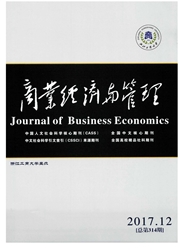

 中文摘要:
中文摘要:
中国是资本品净进口国,资本品进口引致资本积累并通过资本与技能互补效应增加对熟练劳动力的相对需求,是影响熟练劳动力与非熟练劳动力之间相对工资差距的一个重要机制。文章实证检验了资本品进口与中国熟练劳动力的互补效应及其对中国相对工资差距的影响。研究结论是,从长期来看,资本与技能互补效应在中国显著存在,资本品进口促进了中国的资本积累,并通过资本与技能互补效应提高了熟练劳动力的边际产出,增加了对熟练劳动力的相对需求,扩大了相对工资差距。然而,劳动力的相对数量效应和相对效率效应对中国不断扩大的相对工资差距的解释力不强。
 英文摘要:
英文摘要:
The wage of skilled labor relative to unskilled labor has grown significantly over the last 20 years in China.Many studies have found that international trade and skill-biased technological change are the main factors responsible.The paper provides a new explanation for the rising in relative wage gap based on the mechanism of capital-skill complementarity.China is a net importer of capital goods,which induces the accumulation of capital.The paper empirically studies the complementarity between imported capital goods and skilled labor,examines the effect of capital-skill complementarity on relative wage gap in China.It concludes that,the effect of capital-skill complementarity is significant in the long run,so that capital accumulation induced by capital goods import is associated with a high marginal productivity,and a rise in skilled demand and the skilled-unskilled wag gap,meaning that capital-skill complementarity accounts for a lot of the variations in the relative wage gap.However,the change of relative quantity and relative efficiency of skilled labor is not a potentially important explanation for the rising in the relative wage gap.To avoid the inequality and polarization of income distribution,more reasonable policy for capital accumulation and income distribution should be adopted by the government.
 同期刊论文项目
同期刊论文项目
 同项目期刊论文
同项目期刊论文
 期刊信息
期刊信息
